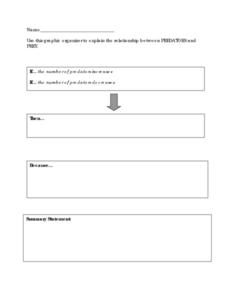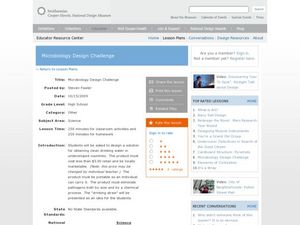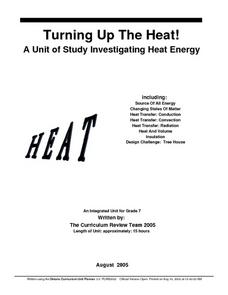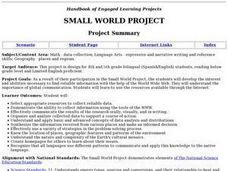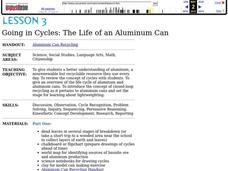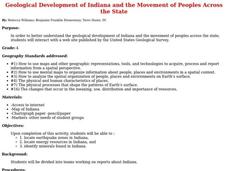Curated OER
Predators and Prey
Students explain how the food chain works. They contrast predators with prey and describe their function in nature. Students discuss how the food chain aids in keeping nature balanced. In small groups, they play a game that simulates the...
Curated OER
Here it Comes Again
Second graders work in small groups with on cup each of warm and ice water. They observe the outsides of the cups. They exhale onto a small piece of mylar or mirrors and discuss the change in appearance. Students discuss where the foggy...
Curated OER
Radiation
Students distinguish between natural and man-made radiation. They measure radiation using a Geiger counter and investigate footprints of radiation.
Curated OER
Urban Changes
Students explore how landscapes undergo constant changes with urban development. They plan and build their own "city" by including features that have minimal resource demands to sustain the city itself.
Curated OER
Agriculture is a Cycle
What do a bicycle and the life cycle have in common? Cover this and more with the series of cross-curricular activities included in this plan. Learners do everything from making bracelets that represent the life cycle to checking out the...
Curated OER
Ecology: Factors Influencing Animal Populations
Young scholars assess the factors affecting animal populations. Working in groups they define specific vocabulary terms and complete several activities from "Project Wild."
Curated OER
Shred a Scarecrow
Students investigate scarecrows. For this farming lesson, students learn why scarecrows are important and construct their own scarecrow from art materials.
Curated OER
Science: How Tall Are Plants
First graders investigate plant growth and examine what factors contribute to plant growth. They keep a class chart of plant growth and write about and illustrate their conclusions.
Curated OER
Oil Crisis: What Would You Do?
The dynamics between the economies and politics of the United States and the Middle East are here to study. Upper graders read and discuss scenarios relating to OPEC and the current oil crisis, then in small groups role-play members of...
Curated OER
Fossil Fuels--Discoveries and Uses
Student examine the close relationship between fossil energy and our daily lives. To demonstrate to the student the close relationship between fossil energy and our daily lives.
Curated OER
Microbiology Design Challenge
Students discover dangers to human health by researching what's in our drinking water. In this water purification lesson, students discuss the conditions of water in undeveloped countries and why it is unsafe to drink....
Curated OER
Global Temperatures
Students analyze the global temperature record from 1867 to the present. Long-term trends and shorter-term fluctuations are both evaluated. The data is examined for evidence of the impact of natural and anthropogenic climate forcing...
Curated OER
Turning Up The Heat!
Students investigate the properties of heat. They explore methods of temperature control and measurement. Through experimentation and activities, students design a high tech tree house. They consider electrical, solar, and natural heat...
Curated OER
Photosynthesis
Seventh graders investigate a multidisciplinary unit with an emphasis in using technology in order to engage them. The students perform Internet research about photosynthesis with a written assessment taken from the WebQuest.
Curated OER
Small World Project
Students participate in the Small World Project that develops their interest and abilities necessary to find reliable information from the Internet and through global communication. They develop homepages, research topics, and produce a...
Curated OER
Going in Cycles: The Life of an Aluminum Can
Students investigate the manufacture of aluminum cans and consider the energy and resources saved when the cans are made from recycled material. They explore the concept of closed-loop recycling using charts, worksheets and discussion.
Curated OER
Water and Ice
Students observe what happens to water as it goes from a solid to a liquid. For this exploratory lesson students gain an understanding for the water cycle while working in groups observing what happens to water as it changes...
Curated OER
Prairie Tic-Tac-Toe
For this prairie organisms worksheet, 8th graders name the role of 18 prairie organisms and tell if they are a biotic or abiotic factor. The organisms include plants and natural forces such as wind and fire.
Curated OER
The Way a Tree Works
Students explore nature by conducting botany experiments. In this plant life lesson, students define the necessary resources for a plant to thrive on our planet while defining scientific vocabulary terms. Students utilize different plant...
Clean Up Australia
Why are Batteries Harmful to the Environment?
Open this lesson by reading together about primary and secondary batteries (such as nickel-cadmium cells), problems they can cause in the environment, and how humans can minimize the damage. Afterward, little ones examine a collection of...
Curated OER
Panther Trivia Pursuit
Sixth graders design trivia game about panthers. In this panther trivia game instructional activity, 6th graders use the Internet to research interesting information about panthers, write the facts on note cards, and create a game based...
Curated OER
Photosynthesis: An enlightening experience
Students observe the effect of light on plants. They illustrate the exchange of gases between the atmosphere and the plant. Students see that plants are part of many natural cycles. They investigate how green plants use the sun's energy...
Curated OER
Geological Development of Indiana and the Movement of Peoples Across the State
Fourth graders examine the geological development of the state of Indiana. Using the internet, they interact with the United States Geological Survey. They identify earthquake zones and energy resources in the state. They work...
Curated OER
Geological Development of Indiana and the Movement of Peoples Across the State
Students are introduced to the geological development of the state of Indiana. Using the internet, they visit the U.S. Geological Survey and locate the earthquake zones in the state. In groups, they locate and identify the energy...


